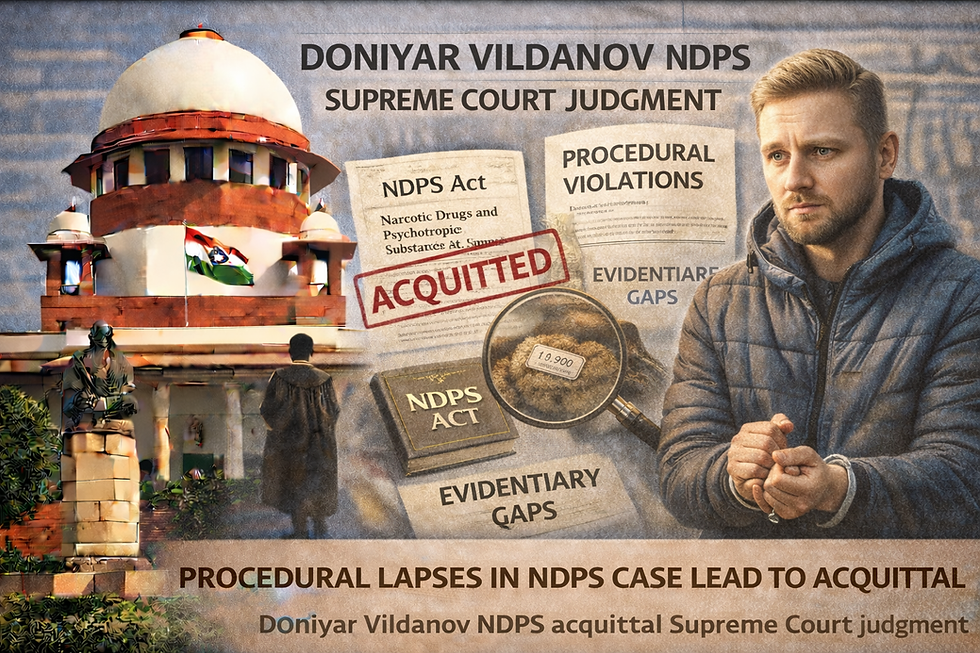India’s Supreme Court Suspends Bhushan Power Liquidation Amid JSW Legal Battle
- Chintan Shah

- Jun 2, 2025
- 3 min read
Introduction
In a key development in India’s insolvency landscape, the Supreme Court has ordered a status quo on the liquidation proceedings of Bhushan Power & Steel Ltd (BPSL), providing JSW Steel with the opportunity to file a review petition against the Court’s recent judgment that annulled its acquisition of the company.
Background: A Landmark Deal Disrupted
In 2019, JSW Steel emerged as the successful resolution applicant for BPSL, one of India’s most indebted steel companies. The deal, valued at ₹19,350 crore, was approved by the National Company Law Appellate Tribunal (NCLAT), and JSW Steel was granted immunity from past criminal investigations linked to the former management of BPSL.
The acquisition was part of the resolution process under the Insolvency and Bankruptcy Code (IBC), aimed at rescuing financially stressed assets through structured bidding.
This transaction was among the largest in India under the IBC framework and was seen as a major step in revitalizing the steel sector. However, it became the subject of prolonged litigation, with various parties, including investigative agencies, objecting to aspects of the resolution plan.
Supreme Court's May 2 Judgment
On May 2, 2025, a division bench of the Supreme Court set aside the NCLAT’s approval of the JSW-BPSL deal. The apex court held that procedural lapses had occurred in the resolution process and ruled that BPSL should instead be liquidated. The judgment shocked industry stakeholders, as it effectively unwound one of the IBC’s most high-profile resolutions, raising concerns about the reliability and finality of insolvency proceedings in India.
JSW Steel, taken aback by the ruling, decided to seek a review of the judgment. The company had until June 2 to file its review petition, a period during which it sought protection from any further action on liquidation.
Status Quo Ordered: Supreme Court Intervenes Again
On May 26, 2025, a bench of Justices B.V. Nagarathna and Augustine George Masih took up an urgent request by JSW Steel to pause the liquidation process. Senior Advocate Neeraj Kishan Kaul, representing JSW Steel, argued that proceeding with the appointment of a liquidator and further steps would create irreversible complications, especially since the time to file a review petition was still available.
Recognizing the merit in this concern, the Court directed that the status quo be maintained in the liquidation process, thereby temporarily freezing any further action. The Solicitor General of India, Tushar Mehta, appearing for the Committee of Creditors (CoC), supported the view that no precipitative action should be taken and proposed deferring the matter in the National Company Law Tribunal (NCLT) until after June 10, allowing the review petition to be heard and decided appropriately.
Legal and Commercial Ramifications
The Supreme Court’s decision to preserve the status quo serves not only to protect JSW Steel’s right to legal recourse but also to signal the importance of procedural safeguards in insolvency proceedings. The case has brought into sharp focus the delicate balance between timely resolution of distressed assets and adherence to due process.
The broader insolvency and corporate community are watching this case closely. The apex court’s May 2 judgment had stirred apprehensions among investors about the sanctity of resolution plans that had already been implemented and closed. With the court now giving JSW Steel a chance to challenge that ruling, some of those fears may be temporarily allayed.
Moreover, the issue of immunity from past criminal investigations—one of the key elements of JSW Steel’s original plan—remains contentious. The way this matter is resolved in the coming weeks could influence the structure and strategy of future resolution plans under the IBC.
Looking Ahead
JSW Steel is expected to file its review petition before the June 2 deadline. If admitted, the petition will be argued before the same bench that passed the original judgment. A successful review could reinstate JSW’s ownership of BPSL, while a denial would mean that liquidation may proceed as per the Supreme Court’s earlier directions.
The case underscores the evolving jurisprudence around insolvency in India, especially in high-value and complex resolutions. It also reiterates the Supreme Court's pivotal role in ensuring that commercial decisions under the IBC are not only speedy but also legally robust.



Comments